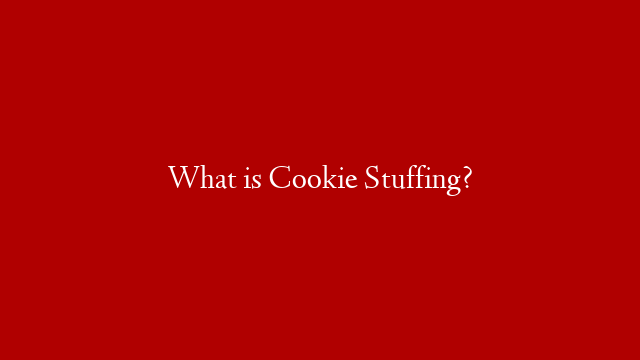Cookie Stuffing is an illegal method of generating Affiliate sales. Affiliates who use cookie stuffing are hoping to get commissions on sales they did not make.
Marketplaces like ClickBank exist to help merchants promote products. The idea is that an affiliate marketer will promote a product, and in return for his expense, time and effort the merchant gives him a percent of the sale. ClickBank makes every effort to protect the effort of the affiliate marketer. ClickBank has a policy that if a consumer visits an affiliate marketers website and leaves, the affiliate will still get credit for the sale if the consumer comes back to purchase the product in 60 days. The affiliate will get credit if consumer makes the purchase up to 60 days after the initial contact. This protects the affiliate since many consumers do not make purchases on the first visit.
ClickBank has to track the consumer for 60 days to enforce this policy. It is done through a cookie. A cookie is a piece of information stored on the consumer’s computer. The cookie is written to the consumers computer when the affiliate website is browsed, and the “hoplink” is clicked. The cookie remains on the consumer’s computer for 60 days. Should the consumer return and purchase the product, the cookie is read and the original affiliate receives credit for the sale.
The presence of the cookie is what has lead to cookie stuffing. The premise is to write ClickBank cookies on a visitor’s computer without the visitor’s knowledge. Should that visitor happen to purchase a product in 60 days, the affiliate will get credit for a sale.
For example, imagine a blog comment or a forum post where an affiliate has managed to place an image tag that points to his hoplink. The affiliate wants these image tags to be on pages with high amounts of traffic. Every visitor who views that page will see a broken image tag. Behind the scenes, the ClickBank cookie with the affiliates code has just been written to the visitor’s computer. Any high traffic website will do. The more people that view the page, the more cookies will be written. Should any of these visitors happen to purchase the product in 60 days the affiliate will get the credit for the sale.
The affiliate marketer simply has to spam as many websites as possible with his image tag (or javascript popup or iframe tag). The more people that end up with his cookie, the more sales he’ll get credit for.
All affiliate programs are vulnerable to this type of fraud. ClickBank and other market places will ban affiliates for this practice. However, it may take some time before the fraud is noticed. In addition, cookie stuffers find better means of hiding their tracks.



